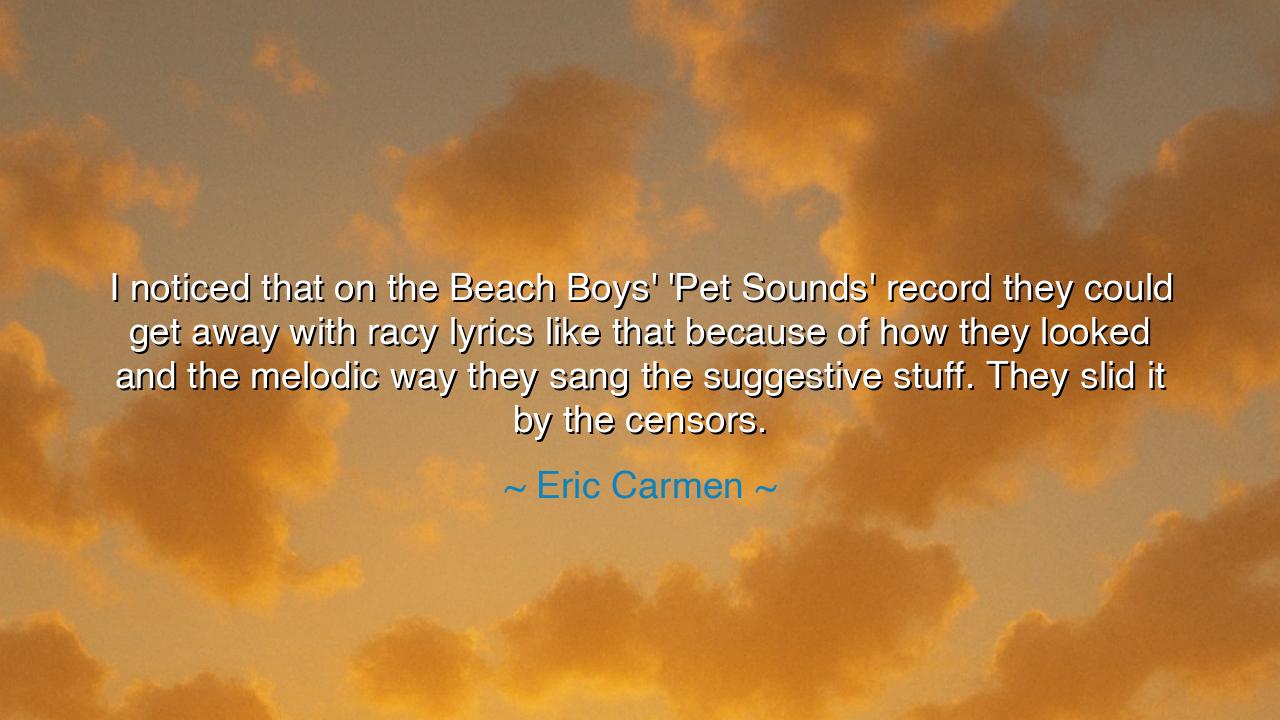
I noticed that on the Beach Boys' 'Pet Sounds' record they could
I noticed that on the Beach Boys' 'Pet Sounds' record they could get away with racy lyrics like that because of how they looked and the melodic way they sang the suggestive stuff. They slid it by the censors.






When Eric Carmen observed, “I noticed that on the Beach Boys’ ‘Pet Sounds’ record they could get away with racy lyrics like that because of how they looked and the melodic way they sang the suggestive stuff. They slid it by the censors,” he was not only commenting on a moment in music history, but also on the eternal interplay between art and authority, between expression and restraint. His words remind us that creativity often thrives in the tension between desire and limitation, and that the artist’s task is not always to confront the gatekeepers head-on, but sometimes to outwit them with subtlety, sweetness, and style.
The meaning here is twofold. First, Carmen points to the power of presentation. The Beach Boys, with their wholesome image of clean-cut youth and their sun-soaked harmonies, could deliver lyrics that hinted at passion and desire without provoking outrage. The very innocence of their appearance became a shield, allowing them to sing of what was once forbidden. Second, Carmen shows us that music’s melody can disguise the edge of its words. A phrase that might sound dangerous if spoken can seem harmless, even beautiful, when carried on waves of harmony. Thus, the artist cloaks truth in beauty, and in this way smuggles meaning past the guards of convention.
History provides many parallels. In ancient Greece, playwrights like Aristophanes hid biting political satire beneath the laughter of comedy. By making his audience laugh, he slid by the censors of his time, speaking truths that might otherwise have earned him punishment. Similarly, during the Soviet era, writers and composers often cloaked dissent within allegory, symbolism, and the soaring beauty of music. The critic who sought to punish could not easily strike down what seemed, on the surface, harmless or uplifting. In this way, art has always found secret passageways into the hearts of the people.
The censors themselves reveal much about society. They stand as guardians of morality, but often they are blind to the subtleties of art. A song sung softly, wrapped in harmony, may evade their grasp while still planting seeds of thought in the minds of listeners. Carmen’s reflection shows us that the most lasting art does not always shout; sometimes it whispers, carrying messages more powerful because they slip beneath awareness. It is like water wearing away stone—not by force, but by persistence.
Yet Carmen’s words also remind us of the cunning of the artist. To create is not only to craft words and sounds, but to understand how they will be received. The Beach Boys knew that their image of innocence was itself a kind of instrument. They wielded it to expand the boundaries of what could be sung. Thus, they teach us that even when direct confrontation seems impossible, art can still subvert, still expand, still push forward. The artist must be both dreamer and strategist.
So, dear listener, the lesson is this: when faced with resistance, do not despair. There are many ways to speak truth. If the door is barred, slip through the window. If the guard watches too closely, cloak your message in beauty. Speak in parables, sing in harmonies, laugh in satire—always remembering that art’s deepest power lies not only in what is said, but in how it is said.
In practical action, this means: if you write, paint, or sing, be mindful of both your message and your medium. Understand your audience, and learn to weave subtlety into your work. Seek inspiration in the greats who came before you—the Beach Boys with their melodic disguises, the poets with their hidden metaphors, the composers with their layered symphonies. Let your creativity not be silenced by barriers, but sharpened by them.
Thus Eric Carmen’s words reveal a truth for all generations: the power of art lies not only in its boldness but in its craft. To outwit the censors, to slip truth into melody, to carry meaning through beauty—this is the art of endurance. And so we are reminded that even in times of constraint, the artist remains free, for creativity will always find a way to sing.






AAdministratorAdministrator
Welcome, honored guests. Please leave a comment, we will respond soon